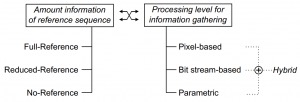In Internet Protocol TeleVision (IPTV) systems, the use of video compression results in a trade-off between random access and bandwidth consumption. Most of the time, priority is given to compression efficiency, resulting in low channel switching performance. In this paper, a Scalable Video Coding (SVC) configuration is proposed, wherein base and enhancement layer are coded in such a way that fast channel switching can be offered without impacting the access network bandwidth consumption. This is achieved by encoding a full quality slow channel switching version of the video stream in the base layer extended with a reduced quality fast switching enhancement layer. Additionally, this configuration offers backward compatibility with H.264/AVC, enabling a gradual upgrade of the IPTV system from H.264/AVC to SVC. When comparing this technique to single layer H.264/AVC, 25.0% bandwidth reduction on the access network is obtained without impacting channel switching speed, but only at the cost of a slightly reduced quality ( -1 dB PSNR) during a short transition period (maximum 48 frames). If a comparison is made with a regular SVC configuration, 39.4% bandwidth reduction on the access network during steady state is obtained. Compared to simulcast H.264/AVC, 32.0% bandwidth reduction on the core network is observed.
 Featured
Featured
PhD - Mixture Models for Light Field Data
PhD - Efficient Optimization and Rendering of Wide Mixture Models for Light Field Data






